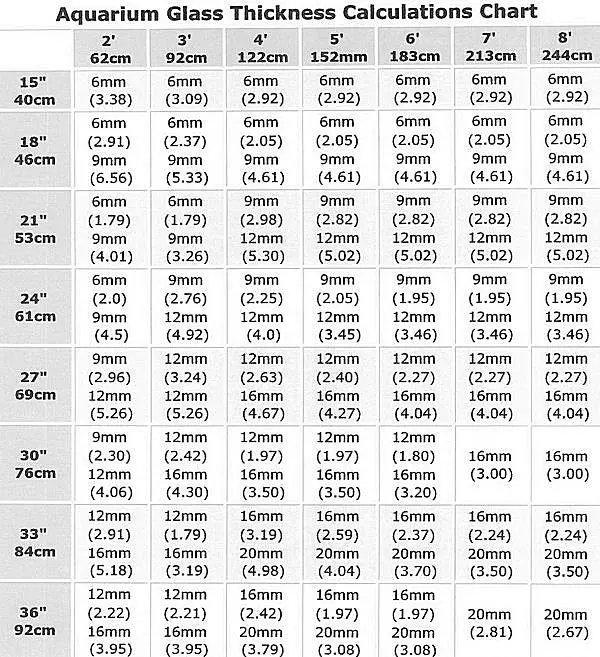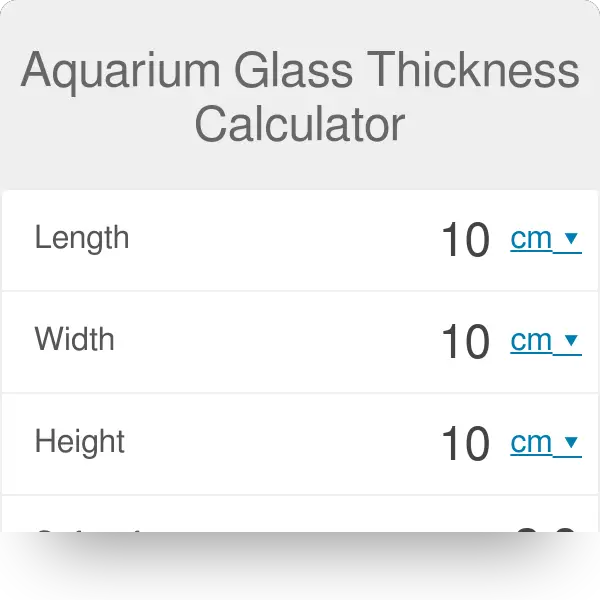Aquariums are a captivating addition to any home or office space. They bring a sense of peace and tranquility, and the variety of aquatic life that can be housed in them is truly astounding. However, when it comes to choosing an aquarium, one of the most crucial factors to consider is the thickness of the glass. The thickness of the glass determines the durability and safety of the aquarium, and making the wrong choice can lead to disastrous consequences.
When it comes to choosing the right thickness for your aquarium, there are several factors to consider. The size of the aquarium, the type of fish you plan to keep, and the location of the aquarium are all important considerations. Understanding these factors and choosing the appropriate thickness can ensure that your aquarium is not only beautiful but also safe and long-lasting. So, let’s dive into the details and explore how thick your aquarium glass should be.
The thickness of your aquarium glass should be determined by the size of your tank. For tanks that are less than 30 inches tall and hold less than 300 gallons of water, the glass should be at least 1/4 inch thick. For tanks that are taller or hold more water, thicker glass is needed. It is important to consult with a professional to ensure proper thickness for your specific tank size.

How Thick Should Your Aquarium Glass Be?
When it comes to choosing the right aquarium for your fish, the thickness of the glass is an important consideration. The thickness of the glass will affect the strength and durability of your aquarium and can prevent accidents that could harm your fish and damage your property. In this article, we will discuss how thick your aquarium glass should be, based on the size of your tank, the type of fish you plan to keep, and other factors.
The Importance of Aquarium Glass Thickness
The thickness of your aquarium glass is crucial as it affects the structural integrity of your tank. Thin glass can create a risk of breakage, leading to leaks or even a complete collapse of the aquarium. So, it is important to select the right thickness of glass for your aquarium.
Factors to Consider
There are several factors to consider when selecting the thickness of your aquarium glass. The size of the tank, the type of fish you plan to keep, and the location where you want to place your aquarium are some of the main factors to consider.
Size of the Aquarium
The size of the aquarium is an important factor to consider when selecting the thickness of glass. Generally, the larger the aquarium, the thicker the glass should be. This is because a larger aquarium has more water pressure that needs to be supported by the glass. A small aquarium can use thinner glass, but for larger tanks, thicker glass is recommended.
Type of Fish
The type of fish you plan to keep in your aquarium also plays a role in determining the thickness of glass. Some fish are more active and can create more pressure on the glass, and therefore require thicker glass. For example, if you plan to keep large, active fish, such as Oscars, you will need thicker glass than if you plan to keep smaller, less active fish, such as guppies.
Location
The location of your aquarium is another important factor to consider when selecting the thickness of glass. If your aquarium will be placed in a high-traffic area, such as a living room or a playroom, thicker glass is recommended to prevent accidental breakage.
How Thick Should Your Aquarium Glass Be?
Small Aquariums
For aquariums up to 20 gallons, glass thickness of around 0.125 inches (3mm) is recommended. This thickness is suitable for most small fish and aquariums in this size range generally do not require additional bracing.
Medium Aquariums
For aquariums between 20 and 40 gallons, glass thickness of around 0.25 inches (6mm) is recommended. This thickness can support more water pressure and is suitable for most types of fish.
Large Aquariums
For aquariums larger than 40 gallons, glass thickness of around 0.375 inches (10mm) or more is recommended. This thickness provides the necessary strength to support the weight of the water and is suitable for larger, more active fish.
Benefits of Using the Right Thickness of Glass
Using the right thickness of glass for your aquarium provides several benefits. First, it ensures the structural integrity of your tank, preventing leaks and breakage. It also provides additional safety for your fish, as thicker glass can withstand more pressure and is less likely to break. Additionally, using the right thickness of glass can ensure the longevity of your aquarium, as thicker glass is more durable and less likely to wear down over time.
Glass vs Acrylic Aquariums
When it comes to selecting an aquarium, you may also be considering whether to choose a glass or acrylic aquarium. Glass aquariums are generally more affordable and more scratch-resistant than acrylic aquariums. However, acrylic aquariums are much lighter and more impact-resistant than glass aquariums.
Pros of Glass Aquariums
– More affordable than acrylic aquariums
– Scratch-resistant
– Easier to clean
Pros of Acrylic Aquariums
– Lighter and easier to move
– More impact-resistant
– Better insulating properties
Conclusion
In conclusion, choosing the right thickness of glass for your aquarium is crucial for the safety and durability of your tank. By considering factors such as the size of your tank, the type of fish you plan to keep, and the location where you will place your aquarium, you can select the appropriate thickness of glass. Remember that a thicker glass can provide additional safety for your fish and ensure the longevity of your aquarium.
Frequently Asked Questions
What factors should you consider when deciding how thick your aquarium glass should be?
When determining the thickness of your aquarium glass, there are several factors that you should take into consideration. One of the most important factors is the size of your aquarium. Larger aquariums will require thicker glass to support the weight of the water and the pressure that it exerts on the sides of the tank. Additionally, you should consider the type of fish that you will be keeping in the aquarium. Some fish are more active and may be more likely to bump into the sides of the tank, so a thicker glass may be necessary to prevent cracking or breaking.
Another important factor to consider is the height of the tank. If you have a taller aquarium, it will require thicker glass to support the weight of the water as well as the increased pressure at the bottom of the tank. Finally, you should consider the overall design and aesthetic of the aquarium. If you want a more visually appealing tank with minimal framing, you may need to opt for thicker glass to ensure the tank can support itself.
What are the standard thicknesses for aquarium glass?
The standard thicknesses for aquarium glass range from 1/8 inch to 3/4 inch. However, the appropriate thickness for your aquarium will depend on its size, height, and the type of fish you plan to keep. Generally, smaller aquariums with a capacity of 20 gallons or less can use glass between 1/8 inch and 1/4 inch thick. For larger tanks, the glass should be at least 3/8 inch thick, and tanks over 48 inches in length should have glass that is at least 1/2 inch thick.
For aquariums that are taller than 24 inches, the glass should be thicker to support the increased pressure at the bottom of the tank. In these cases, the glass should be at least 1/2 inch thick. Additionally, if you plan to keep large or aggressive fish, you may want to opt for thicker glass to prevent damage to the tank.
What are the consequences of using glass that is too thin for your aquarium?
Using glass that is too thin for your aquarium can have disastrous consequences. As the water in the tank exerts pressure on the sides of the tank, the glass may begin to bow or warp. This can cause cracks or even a complete failure of the tank, resulting in flooding and damage to your home or property. Additionally, using thin glass can be dangerous for the fish in the tank. If the glass breaks or cracks, the fish can become injured or even die as a result of being exposed to the air.
What are the benefits of using thicker glass for your aquarium?
Using thicker glass for your aquarium can provide a number of benefits. Thicker glass is less likely to bow or warp under the pressure of the water, making it a safer and more reliable option for your tank. Additionally, thicker glass can provide better insulation for your tank, helping to maintain a stable water temperature and reducing the need for additional heating or cooling equipment.
Using thicker glass can also be beneficial for the overall aesthetics of your aquarium. Thicker glass can reduce the need for framing, providing a more seamless and visually appealing look. Finally, thicker glass is generally more durable and long-lasting, reducing the need for frequent repairs or replacement.
Should you always opt for the thickest glass possible for your aquarium?
While thicker glass can provide a number of benefits for your aquarium, it may not always be necessary or practical. Thicker glass can be more expensive and heavier, making it more difficult to move or install your aquarium. Additionally, thicker glass may not always be necessary depending on the size and type of fish you plan to keep.
Ultimately, the appropriate thickness of glass for your aquarium will depend on a variety of factors, including the size and height of the tank, the type of fish you plan to keep, and your overall design preferences. It is important to carefully consider these factors and consult with a professional or experienced aquarium hobbyist before making a final decision on the thickness of your aquarium glass.

Best glass mm for your fish tank | Aquarium glass thickness calculator
After considering the factors that affect the thickness of aquarium glass, it is safe to conclude that the thickness of the glass should be chosen based on the size and water capacity of the aquarium. A general rule of thumb is to choose glass with a thickness of at least 6mm for tanks with a capacity of 150-200 liters. However, larger tanks may require thicker glass to ensure the safety of the fish and the people around them.
It is important to keep in mind that the glass thickness is not the only factor that determines the strength and safety of the aquarium. Proper installation and maintenance are also crucial to ensure the long-term durability of the tank. Regular inspection of the glass and seals, as well as proper cleaning and water changes, can help to prevent cracks and leaks.
In conclusion, choosing the right thickness of glass for your aquarium is essential for the safety of your fish and the longevity of the tank. By considering the size and water capacity of the tank, as well as proper installation and maintenance, you can ensure that your aquarium will provide a safe and enjoyable environment for your aquatic pets.

